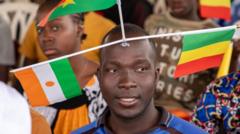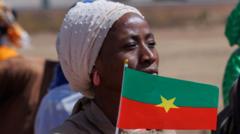Leaders of the Economic Community of West African States (ECOWAS) have sanctioned the withdrawal of Mali, Burkina Faso, and Niger from the bloc, marking a first in its 48-year history, while permitting a six-month reconsideration period for the departing states.
West African Bloc Faces Historical Shift with Military States' Exit from ECOWAS

West African Bloc Faces Historical Shift with Military States' Exit from ECOWAS
In an unprecedented move, three military-ruled nations opt out of a vital trade alliance.
The Economic Community of West African States (ECOWAS) is facing a historic shift as Mali, Burkina Faso, and Niger prepare to leave the regional bloc following their refusal to restore democratic governance. This decision, affecting some 76 million citizens and over half of the bloc's geographical territory, represents a significant fracture in West Africa’s political landscape.
During a recent summit in Nigeria, ECOWAS leaders confirmed their respect for the three nations' choice to exit but extended an olive branch, allowing a six-month grace period from January 29 to July 29, 2025, during which the countries can reconsider their withdrawal. The three nations have already indicated that their decision is final, driven by tense relations attributed to military coups that have seen these states increasingly align with Russian influences as opposed to Western powers.
Mali, Burkina Faso, and Niger were foundational members of ECOWAS, established in 1975 to foster economic and political integration across West Africa. Currently, citizens of ECOWAS member states enjoy the right to live and work freely within the region, benefiting from the relatively stable trade dynamics generated by the alliance.
The imminent departure of these three states raises concerns about regional solidarity and cooperation, especially in light of their consolidation into a new grouping, the Alliance of Sahelian States (ASS). This new entity has already proclaimed commitments to bolstering intra-regional ties, including the establishment of visa-free travel and residency rights for ECOWAS citizens.
The departure comes as ECOWAS has intensified negotiations, led by Senegalese President Bassirou Diomaye Faye and Togolese leader Faure Gnassingbé, in hopes of prompting the military governments to reconsider their exit. However, these discussions have so far yielded little progress, with the military rulers of the three nations adamant in their stance.
Reflecting on this development, ECOWAS Commission head Omar Touray expressed disappointment, branding the exit as "disheartening" and emphasizing ongoing mediation efforts. The decision to leave follows a backdrop of military coups that have alarmed ECOWAS, which aims to promote democracy and stability in the region, yet struggles with dissenting regimes that increasingly pivot towards non-Western alliances.
As old ties begin to unravel, the coming months will be pivotal in determining whether these nations will remain estranged from ECOWAS or find a path back to collaboration.





















